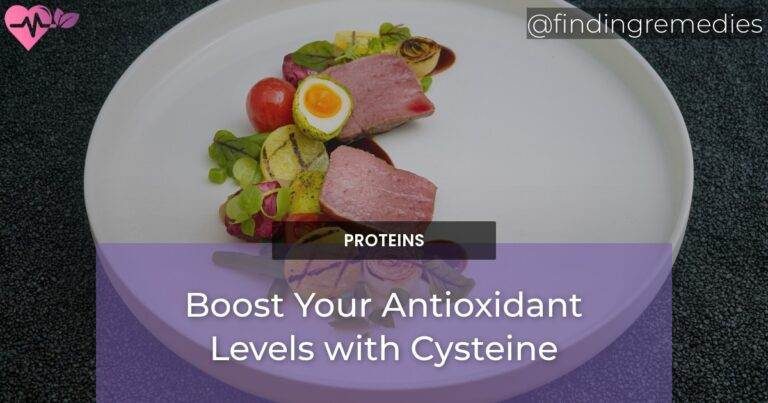Cysteine is a non-essential amino acid that plays a crucial role in various physiological processes in the body. It is known for its antioxidant properties and ability to support detoxification. Additionally, cysteine plays a key role in protein structure, collagen production, and skin health. In this comprehensive article, we will explore the numerous health benefits of cysteine, its dietary sources, recommended dosage, and potential side effects.
Can Cysteine and Tryptophan be Combined for Maximum Health Benefits?
Yes, cysteine and tryptophan for sleep and mood can be combined for maximum health benefits. Cysteine helps with detoxification and antioxidant activity, while tryptophan plays a key role in the production of serotonin, which regulates mood and sleep. Together, they can support overall well-being.
Cysteine: An Essential Amino Acid
Cysteine Roles in the Body
Cysteine serves multiple important functions in the body. Firstly, it is a vital building block for protein synthesis, contributing to the structure and function of various proteins throughout the body. Secondly, cysteine plays a crucial role in the detoxification process by supporting the production of glutathione, the body’s master antioxidant. Lastly, cysteine is involved in collagen production, which is essential for maintaining healthy skin, hair, and nails.
Protein Structure and Function
Cysteine is an essential component of many proteins, providing stability and structure. It forms disulfide bonds with other cysteine residues, contributing to the folding and three-dimensional structure of proteins. This allows proteins to carry out their specific functions effectively.
Detoxification and Antioxidant Defense
One of the key roles of cysteine is its contribution to the body’s detoxification and antioxidant defense systems. Cysteine is necessary for the synthesis of glutathione, a powerful antioxidant that helps neutralize harmful free radicals and toxins in the body.
Collagen Production and Skin Health
Cysteine is involved in the production of collagen, a protein that provides structure and elasticity to the skin, hair, and nails. Adequate cysteine levels are essential for maintaining healthy skin and promoting the regeneration of these tissues.
Cysteine Health Benefits
Enhanced Antioxidant Capacity
By supporting glutathione production, cysteine helps enhance the body’s antioxidant capacity. This can help protect cells and tissues from oxidative damage, reducing the risk of chronic diseases associated with oxidative stress.
Detoxification Support
Cysteine aids in the detoxification process by promoting the synthesis of glutathione. This antioxidant molecule helps eliminate harmful toxins and heavy metals from the body, supporting overall detoxification and liver health.
Improved Immune Function
Cysteine plays a role in supporting immune function. It helps strengthen the body’s defense against infections and promotes the production of antibodies, which are essential for immune response and protection against pathogens.
Promotion of Hair and Nail Health
Cysteine is crucial for the health and growth of hair and nails. It is a key component of keratin, the protein that makes up hair strands and nails. Adequate cysteine levels contribute to strong, resilient hair and nails.
Potential Mental Health Benefits
Studies have suggested that cysteine may have potential mental health benefits. It has been shown to support brain function and neurotransmitter balance, potentially helping manage mood disorders such as depression and anxiety.
ALSO READ
Cysteine Food Sources
Animal-Based Sources
Cysteine can be obtained from various animal-based sources, including poultry, eggs, dairy products, and meat. These foods are rich in cysteine and provide other essential nutrients necessary for overall health.
Plant-Based Sources
Plant-based sources of cysteine include legumes (such as lentils and chickpeas), soy products, nuts, and seeds. These plant-based foods provide cysteine in addition to fiber, vitamins, minerals, and other beneficial plant compounds.
Cysteine Dosage and Supplementation
Recommended Dosage
The recommended daily intake of cysteine is not established, as it is a non-essential amino acid and can be synthesized by the body. However, some studies suggest a dosage range of 500-1,000 mg per day for optimal health benefits.
Possible Side Effects
Cysteine supplementation is generally safe when taken in recommended dosages. However, high doses may cause gastrointestinal discomfort, such as nausea, diarrhea, or stomach cramps. It is important to follow the recommended dosage guidelines and consult with a healthcare professional before starting any supplementation.
Consultation with a Healthcare Professional
If you are considering cysteine supplementation or have specific health concerns, it is advisable to consult with a qualified healthcare professional. They can provide personalized advice based on your individual needs and medical history.
Supplements Containing Cysteine
Cysteine can be found in various dietary supplements, often combined with other amino acids or antioxidants. When choosing a supplement, ensure it is from a reputable brand and consult with a healthcare professional for guidance.
Conclusion
Cysteine, a non-essential amino acid, offers a range of health benefits. From supporting antioxidant defense and detoxification to promoting healthy hair, nails, and collagen production, cysteine plays a vital role in overall health and well-being. While it can be obtained from dietary sources, supplementation may be beneficial for certain individuals. As with any supplement, it is important to consult with a healthcare professional to determine the appropriate dosage and ensure safety.

